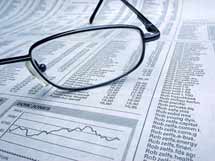Some On Wall Street Worry About Recession genre: Econ-Recon

Despite recent gains on Wall Street, there is a growing group of economists and financial managers that worry we may be headed towards a recession. These fears are being driven by the recent data and burgeoning uncertainty surrounding the housing industry. BusinessWeek has the details in an article that can be found here.
Despite Wall Street's high spirits, a voluble minority of economists continues to warn of a coming recession, possibly arriving as early as this year. The slowing housing market, an inverted Treasury yield curve, and lingering inflationary pressures could mean the U.S. economy is in for a hard landing, some economists say.
On Sept. 15, Morgan Stanley (MS) economists acknowledged a "vigorous" internal debate over the recession threat. "We all agree that the U.S. housing downturn has escalated recession risks," says Richard Berner, Morgan Stanley's chief U.S. economist. "But the argument over how much collateral damage will result and the nature of the offsets to U.S. housing weakness is far from settled."
Economists have a poor track record for predicting recessions. According to The Economist, 95% of economists in March, 2001, thought a recession would not occur that year, though one actually began the same month. "Professional forecasters…are always way overoptimistic and systematically miss the turn downward of the business cycle," notes New York University economist Nouriel Roubini, who pegs the odds of a recession in 2006 at 70%.
The cooling housing market is a key impetus behind many recession fears. Recent years of consumers tapping home equity to make purchases could give way to a consumer-spending slowdown, according to some analysts.
"As we've said before, it is a case of when, not whether, falling consumption will precipitate the next downturn," says U.S. Bank (USB) economist Tucker Hart Adams, who sees a 75% chance of recession before the end of 2007.
Given recent reports on the quantity of home loans with unfavorable terms and insufficient equity, it seems more likely that any significant issues with housing sales or pricing could have inordinately negative economic consequences. There are reports from a number of markets that sales have stalled and that prices are beginning to decline. Should that trend expand nationwide, the impact could be devastating.
Even economists who project continued economic expansion have found the housing weakness unsettling. "The dramatic softening of the housing market has increased the probability of recession in 2007 to one-third," says Larry Adam, chief investment strategist for Deutsche Bank Alex. Brown (DB). The International Monetary Fund cited the housing slump Sept. 14 as it trimmed its forecast for 2007 U.S. economic growth.
Elsewhere, the inverted Treasury yield curve has added fuel to the pessimistic fire. An inverted yield curve occurs when long-term rates drop below short-term rates. Since 1970, every time the yield curve has inverted, a recession has followed.
This historical precedent bodes poorly for corporate profits, some analysts say. "Earnings expectations for 2007 are probably too optimistic," says Richard Bernstein, chief investment strategist at Merrill Lynch (MER), in a Sept. 7 report. "A profits recession is reasonably likely around mid-to-late 2007."
Still, most economists forecast that economic growth will slow without slipping into recession. The chances for a soft landing are better than they might seem, according to Standard & Poor's Investment Policy Committee.
Nevertheless, the bearish views are worth keeping in mind, even when market gains make them all the more tempting to ignore. While a recession may not lurk on the horizon, investors shouldn't let a surprising September blind them to the risks.
As we approach the November midterm election, it seems the Democrats could benefit from citing the potential for recession...especially if gas prices continue to decline...a trend that could help Republicans bolster their assertions that the economy is strong. Recent surveys indicate that the recent economic growth has not translated into noticeable benefits for most working class Americans...a further reason for Democrats to make economic uncertainty a key issue in the next few weeks.
Post a comment